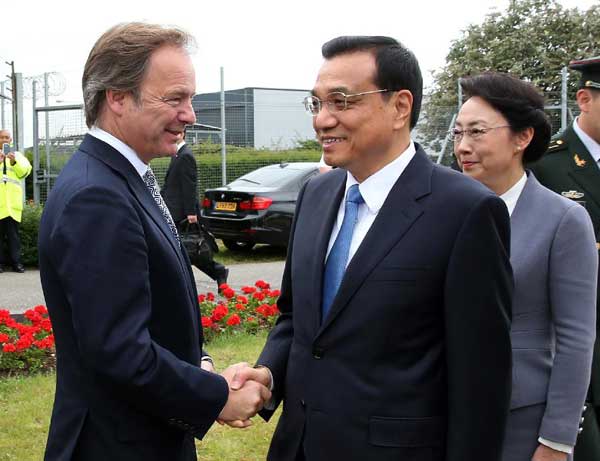LONDON, June 16 -- Britain is an "important partner" of China and the two countries boast many areas for win-win cooperation, says Chinese Premier Li Keqiang.
"The United Kingdom is a great country and an important partner of China," Li said in an article published in British newspaper The Times on Monday.
The premier is to arrive here later in the day for an official visit, which he said has a threefold purpose, with the first being "to discuss ways to deepen cooperation in various fields and thus spur the growth of our respective economies."
"Second, to present the real China so as to change misperceptions and ease misgivings; and third, to draw on British perspectives and experience," Li added.
Britain, he noted, has a strong economy, a dynamic financial sector and advanced science and technologies, and leads the world in energy conservation and environmental protection.
China, for its part, has a huge market, large foreign exchange reserves and a competitive manufacturing sector, Li said, pointing out that the complementary strengths of the two countries mean they have many areas for collaboration.
"We look forward to stronger cooperation in finance, infrastructure construction, among others, and more robust exchanges in research, education, and culture," Li said. "We look forward to win-win engagements."
Noting that war-weary humankind has realized the paramount value of peace and that in today's globalized environment nations can develop together in a peaceful manner, he stressed that the world needs to be steadfast in addressing challenges and differences through dialogue and consultation.
"Nothing can make us turn our back on peace," said the Chinese premier.
As a beneficiary and a contributor to peace and as a major country on the world stage, China will "dedicate itself to securing peace and cooperation," he pledged.
In the article, Li also shared his insights on China's development, saying that although China has indeed achieved "a quantum leap" in its development, it remains "far from achieving its development goals."
The premier listed out three pressing tasks in China's urbanization process: to help 100 million rural migrants enjoy resident status in cities and towns in eastern China; to accommodate 100 million rural people as local residents in cities and towns in central and western China; and to provide 100 million people living in rundown urban areas with decent housing.
China's "quest for modernization remains a long and arduous one," he said. "As premier, my highest priority is to pursue modernization through urbanization and industrialization."
China's economy needs to grow at a proper rate, and the 7.5-percent growth expected this year "is slower than the past, but normal," said the Chinese leader.
"Despite considerable downward pressure, China's economy is moving on a steady course. We will continue to make anticipatory and moderate adjustments when necessary. We are well prepared to defuse various risks. We are confident that this year's growth target will be met," he added.
Noting that reform and opening up remain key to China's modernization, he said "we need to stay the course on market-oriented reform ... and open China still wider to the outside world."
The premier also pledged to encourage the development of the private sector and impose tougher penalties on intellectual property rights infringement, environmental pollution and unfair competition.
"This will give foreign investors the same level playing field and greater space for development, just like their Chinese counterparts," Li said.

 College girls take stylish photos to help enrollment
College girls take stylish photos to help enrollment Top 10 Chinese products scoring World Cup goal
Top 10 Chinese products scoring World Cup goal PLA units hone their tank combat skills
PLA units hone their tank combat skills Attendants shine at Xinjiang-Lanzhou high-speed rail
Attendants shine at Xinjiang-Lanzhou high-speed rail Jiuzhai Valley - fairyland of the world
Jiuzhai Valley - fairyland of the world Can't take eyes off national teams in World Cup
Can't take eyes off national teams in World Cup Beijing strips off to celebrate summer
Beijing strips off to celebrate summer
 Traditional wedding ceremony of China's Buyi ethnic group
Traditional wedding ceremony of China's Buyi ethnic group Art school students present works in Nanjing
Art school students present works in Nanjing Top 20 hottest women in the world in 2014
Top 20 hottest women in the world in 2014  China's top 10 representative architectures
China's top 10 representative architectures Cute animals' leisure summer in zoo
Cute animals' leisure summer in zoo Exhibition of the Buddha held in Tibet
Exhibition of the Buddha held in Tibet Grandpa Kang takes Gaokao for 14th time
Grandpa Kang takes Gaokao for 14th time Incredible animal migration in Xinjiang
Incredible animal migration in Xinjiang